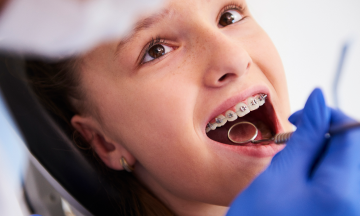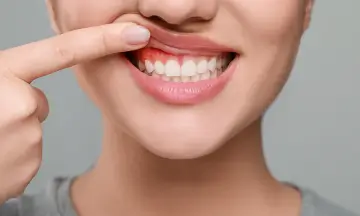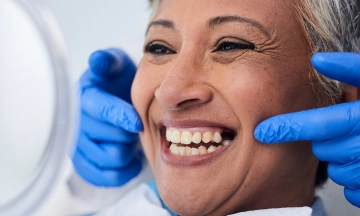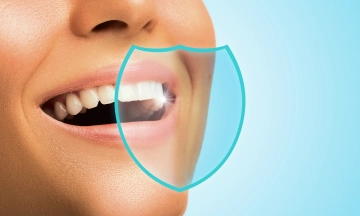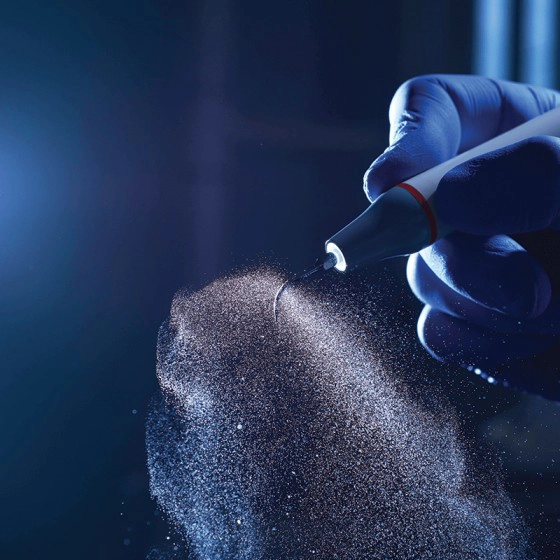
Do you notice slight blood in the sink every time you brush your teeth? Do you see blood while biting into an apple? This bleeding is one of the first warning signs of gum disease. In gingivitis, only the gums are infected. If left untreated, the infection travels below the gum line, into the bone, causing a more serious form of gum disease called periodontitis.
Periodontitis is a serious gum infection that not only damages the gums but can also destroy the bone that supports the teeth if left untreated. It can also lead to tooth loss!
If you think that this disease affects only adults, you are absolutely wrong! Periodontal disease not only affects adults but has also been a very common disease among children and teenagers. According to a survey conducted in India, periodontitis was observed by the age of 15; and at 17 years, 10% of Indian boys were known to suffer from it!
Although Periodontitis is common, remember it is largely preventable if diagnosed early.
What are the symptoms of Periodontal disease?
Here are a few signs and symptoms of periodontitis:
If you have any of the above symptoms then consult the dentist in Bangalore.
What are the causes of Periodontal disease?
Plaque - a sticky film composed mainly of bacteria - is the primary cause of gum disease. If left untreated, plaque can:
Besides plaque, here are a few other causes of Periodontal disease:
What are the treatments available for Periodontal disease or gum disease?
There are Surgical as well as non-surgical treatments available:
Surgical Treatments:
-
Flap surgery or pocket reduction surgery: In this procedure, the gums are lifted or pulled back (to create a flap) to clean the roots of the teeth and repair damaged bone. The space between the gum and tooth is reduced in this type of surgery, thereby decreasing the areas where plaque can grow.
-
Bone grafts: In bone grafting, a piece of bone is removed from another part of the jaw or the body, and transplanted to the jawbone. This bone graft then works with the body to build a new bone, helping in restoring stability to teeth.
-
Guided tissue regeneration: This procedure is done in combination with flap surgery, where a small piece of mesh-like fabric is inserted between the bone and gum tissue which helps in stopping the gum tissue from growing into the area where the bone should be. This allows the bone and the connective tissue to regrow and better support the teeth.
Non-Surgical Treatments:
-
Professional dental cleaning: This is an important gum disease preventive measure. During a professional cleanup, the dentist will remove plaque and tartar from above and below the gum line, which is impossible to be removed by brushing and flossing.
-
Scaling and root planing: Scaling and root planing is done if your dentist or periodontist finds out that you have tartar under the gums. When all the tarter below and above the gum line is removed, it is called Scaling. Scaling makes sure the cleaning is done all the way down to the bottom of the pocket. Root planing smoothes out the teeth roots to help gums reattach to the teeth. Scaling and root planing may require local anaesthesia and may take more than one visit.
Are you afraid after reading the surgical methods of treatment? Usually, in most cases, gum diseases are treated using the non-surgical procedure of scaling and root planing. Surgery is only needed when the tissue around the teeth cannot be repaired with nonsurgical options.
Looking for a periodontitis treatment in Bangalore then book an appointment at Sakra World Hospital.
Is Gum Disease Linked to Other Health Problems?
There is a potential connection between gum disease and other serious health conditions. The bacteria in the mouth is known to make their way into the bloodstream, at times causing health problems such as heart disease and stroke. Another health condition that has often been associated is gum disease is infertility, although the research on this subject is still in-progress. Diabetes is another health condition that not only is a risk factor for gum disease, but gum disease can make diabetes worse.
Is there a way to prevent periodontitis?
The best way to prevent periodontitis is to maintain a proper and regular program of good oral hygiene:
If you are more susceptible to gum disease, we recommend you visit a dental clinic in Bangalore for frequent check-ups, cleanings, and treatments to better manage the condition. Remember, oral health affects overall health.








